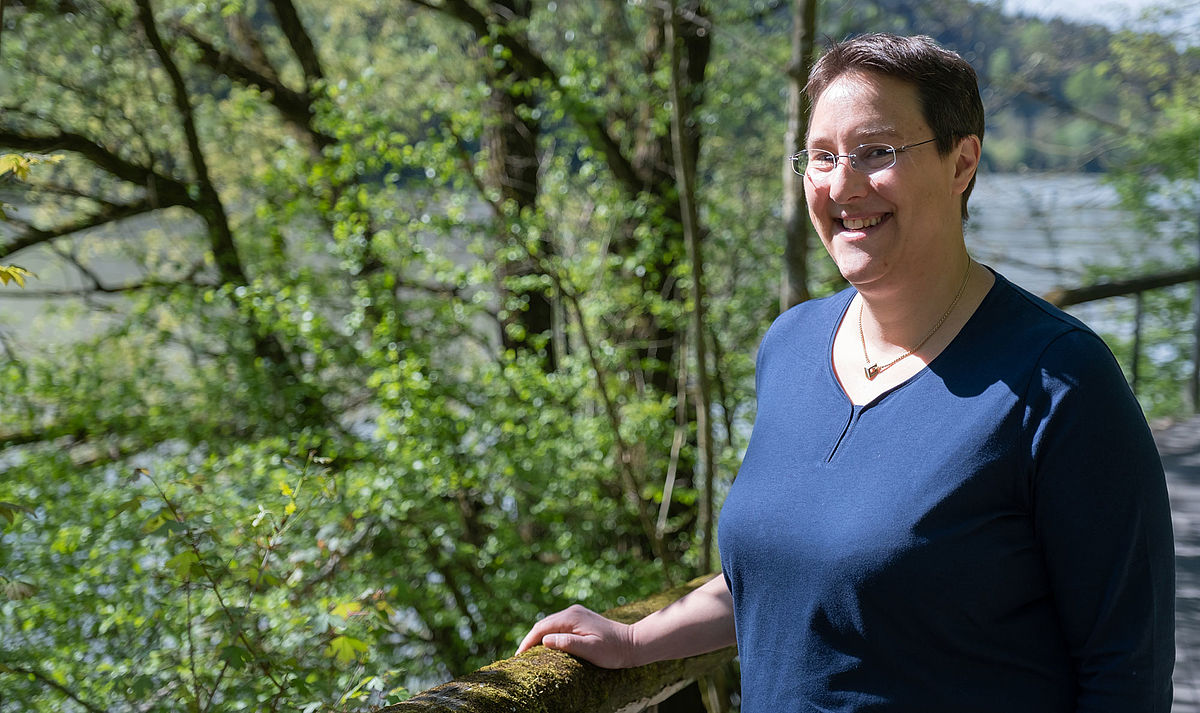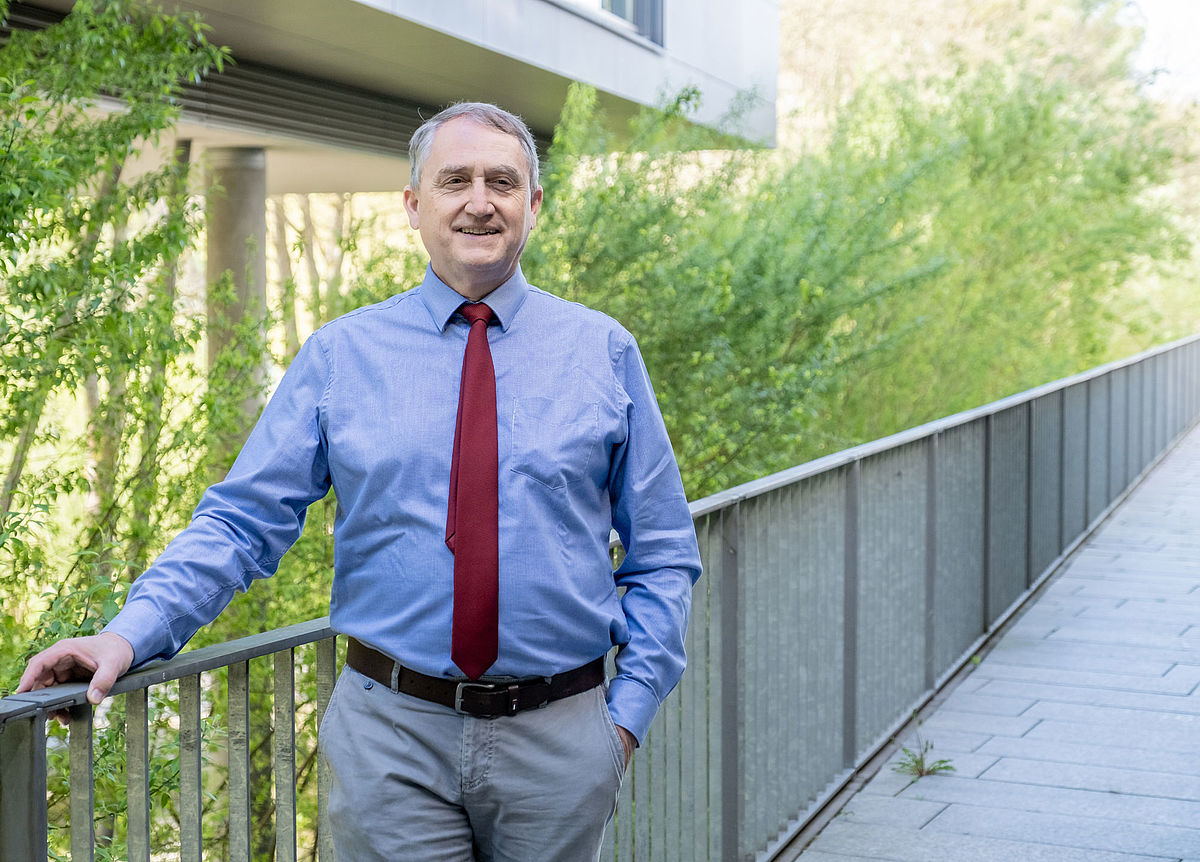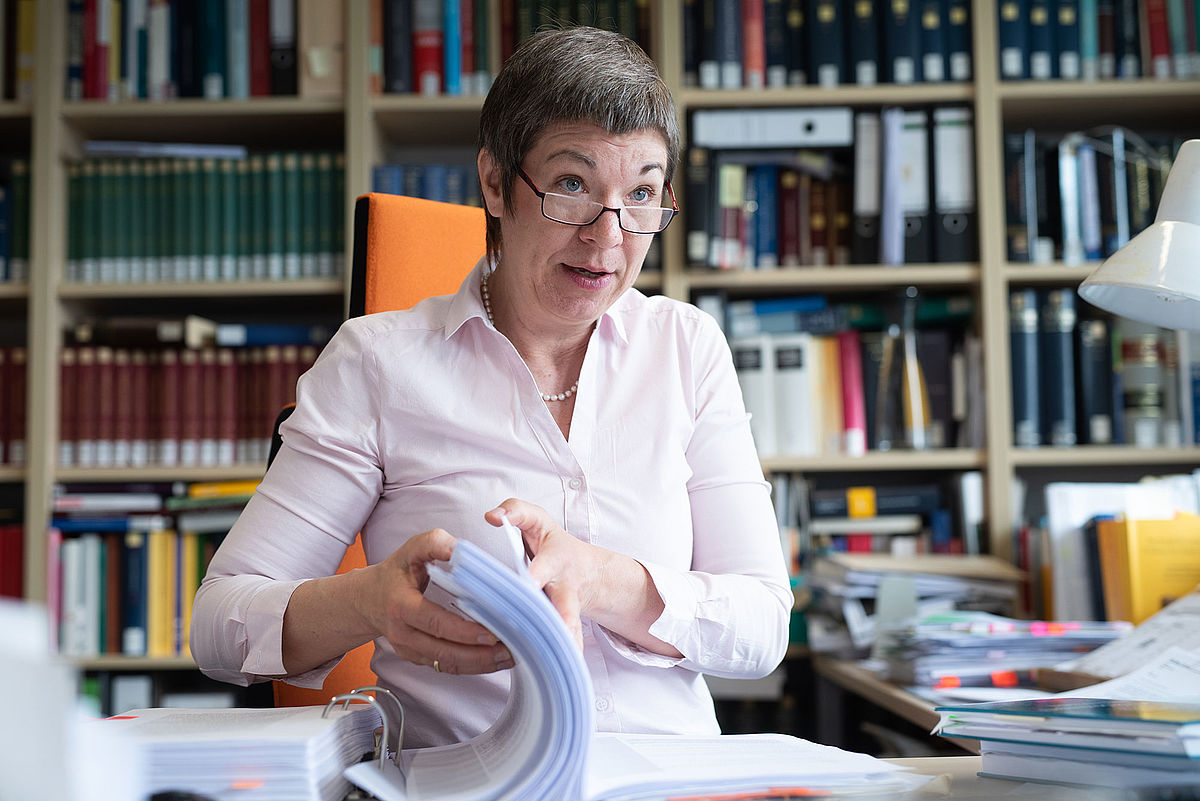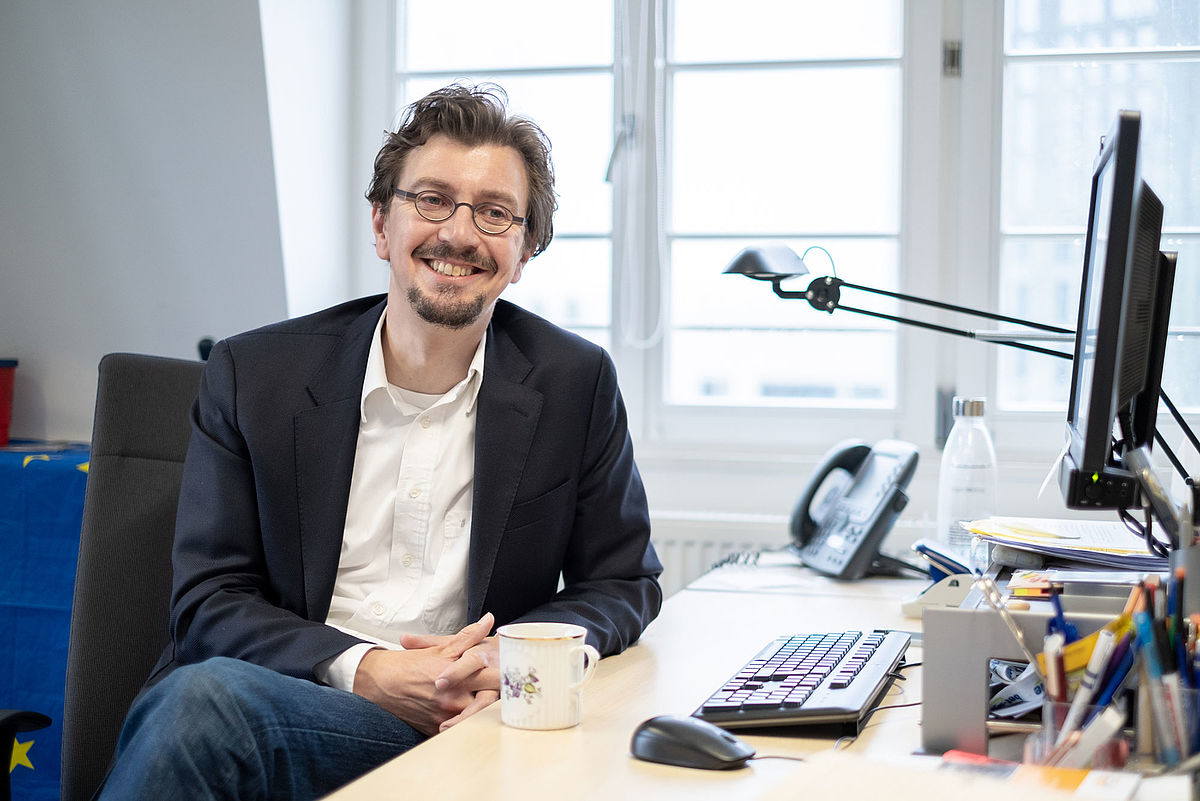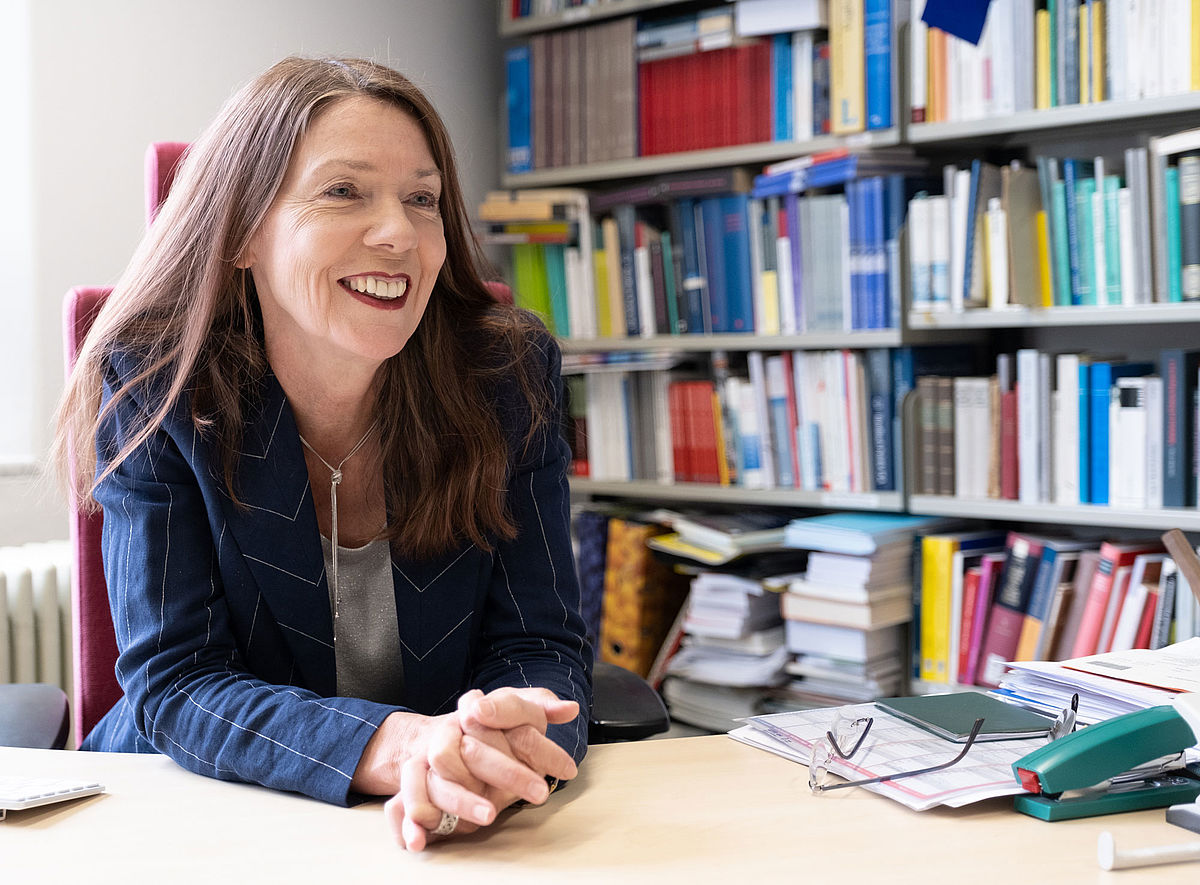Everyone go out and vote! This request is particularly aimed at young people, as they are the ones who will shape the future of Europe.
Professor Brigitte Forster-Heinlein, Professor of Applied Mathematics
To mathematician Professor Brigitte Forster-Heinlein, maintaining contacts in her subject area on a European and international level is a matter of course. She is able to take advantage of EU networks from her time as a postdoctoral fellow, which enabled her to develop transnational acquaintances and friendships.
“Everyone go out and vote! This request is particularly aimed at young people, as they are the ones who will shape the future of Europe. I was fortunate enough to experience Europe’s coalescence from childhood – I come from a small village of 1800 people that was twinned with a village in France. We visited the French village for the first time when I was six years old. Our artisans joined their French colleagues to take a look around: their shared activities and interests enabled them to communicate fairly well.
My favourite part of this visit was a maths lesson taught at the French primary school, as I did not yet speak French at this point, but maths is an international language. Our French partner family visited us virtually every year. I can still remember how excited they were one time when they arrived: “We crossed the border and didn’t have to show our passports!” Open borders, the euro, the opportunities provided by Erasmus – all of this has brought Europe closer together. I hope that everyone living here is able to root themselves in Europe as we researchers can. This creates friendships across Europe, breaking down the borders in people’s minds.”
My hope for Europe is that this current era of national boundaries we are experiencing soon comes to an end, and borders open up again.
Professor Franz Lehner, holder of the Chair of Information Systems (Information and IT Service Management)
In the summer semester of 2019, Professor Susanne Mayr is working with Professor Hannah Schmid-Petri and Professor Franz Lehner to once again organise a lecture series on how digitalisation is changing economy and society. The team invites people from all subject areas and countries to attend.
“Europe connects me to a widely ramified European network on both a professional and a private level. This is not a given for my generation: when I studied computer science in Vienna and Linz, experience of living abroad was the exception. My journey to other European countries led me to a USA project in Ann Arbor, Michigan. I was 34 when I braved this three-month adventure and tested out whether I could teach and undertake research in English in the USA. The first two weeks were difficult, but I struggled through. During this visit I got to know Professor Rick Watson at the University of Georgia, who also opened many doors for us as a family and ultimately passed on his wanderlust and curiosity about other countries and cultures.
I hope that Europe and this current era of national boundaries we are experiencing soon comes to an end, and borders open up again. Straightforward cross-border exchange with colleagues, something that has become a matter of course in academia, should be open to all. It would be good for European integration if the triumph of technological innovations made a similar breakthrough in social and societal arenas. Perhaps our work as researchers can help with this.”
Women’s rights – an area where Europe can and should serve as an example to the world.
Professor Daniela Wawra, Vice President for Study, Teaching and International Matters at the University of Passau
Professor Daniela Wawra holds the Chair of English Language and Culture and is Vice President for Study, Teaching and International Matters at the University of Passau. She has also been Vice President of the German Association of University Professors and Lecturers since 2010. At the University of Passau, she heads the examining committee for the B.A. (Major) and M.A. European Studies degree programmes, which use a combination of findings, theories and methodologies from cultural studies and social science to enable students to tackle European topics and issues in a scientifically sound way across multiple levels and from various perspectives – and subsequently to make a professional contribution to an intricately interconnected Europe.
I associate Europe with cultural and linguistic diversity and values such as human dignity, human rights, and in particular also women’s rights – an area where Europe can and should serve as an example to the world. And there is one thing we must remember in the context of all of our current turmoil: Europe is a peace project.
To me, Europe is something very personal.
Professor Harald Kosch, Vice President for Academic Infrastructure and IT Facilities at the University of Passau
Professor Harald Kosch holds the Chair representing the subject of Distributed Information and Multimedia Systems. As a researcher and networker, he has been engaged in collaborations across Europe and with France in particular for more than a decade, and established the International Research and Innovation Centre in Intelligent Digital Systems (IRIXYS) whose members include Passau as well as INSA Lyon and the Università degli Studi di Milano. Harald Kosch’s commitment has gained him the Award for Services to Internationalisation of the University of Passau, as well as France’s “Chevalier de l‘Ordre des Palmes Académiques” national order of merit.
After completing an intermediate diploma and spending another year studying at TU Munich, I decided to move to France. My arrival had already been made easier by the coalescence of Europe: for example, as a foreign national I could apply on an equal footing with French students, and academic achievements were widely recognised. However, it was by no means easy for me. ERASMUS grants did not yet exist, and unlike my French colleagues – who had access to doctoral fellowships – I had to make my own living. I really wanted to continue working in the French research laboratory, which offered excellent conditions for research in parallel computing, so I took a part-time job as a German teacher and taught in a kindergarten. 1995 saw the arrival of Europe’s common working area directive, which helped me greatly: as a German, I was suddenly considered an equal on the French labour market, and could take a position as a graduate research assistant and finish my thesis. In view of this, to me, Europe is something very personal.
Europe has a very specific European idea of justice: it is about reason and fairness.”
Professor Ulrike Müßig, holder of the Chair of Civil Law, German and European Legal Historian
Professor Ulrike Müßig is a European Research Council advanced grantee. She headed the “ReConFort – Reconsidering Constitutional Formation” project (grant agreement no. 339529, ReConFort) in which legal scholars spent four years researching historical constitutional debates in Belgium, Germany, Italy, Poland and Spain.
“Europe has a very specific European idea of justice: it is about reason and fairness. It incorporates the Aristotelian idea of goodness, the English concept of equity that uses the law to compensate for hardship, and a reason-based fairness that goes beyond formal justice. Professor Kurt Lipstein, who I was fortunate enough to learn from as a student at Cambridge, impressed me with his legal scholarship permeated with this idea. Having fled to England as a Jewish civil servant in 1933, he spent the Blitz as a faculty assistant on the very pointed roof of the Squire Law Library. With three buckets of water to combat German bombs!
This elder statesman of English international inheritance law and author of the first English textbook on European law could not and would not disappoint anyone who was looking for a book in the old Squire (where they were confusingly sorted by size). ‘Justice seen to be done’ was based on values that are both British and European: reason and fairness. Kurt Lipstein embodied and taught we German students in the 1990s that fairness could be reasonably achieved by striving time and again for a distinction between ‘what is’ and interpretation.”
You feel at home anywhere in Europe. When Notre Dame burned, our hearts were burning too.”
Professor Carolin Häussler, holder of the Chair of Organisation, Technology Management and Entrepreneurship.
Professor Carolin Häussler has been a member of the federal government’s Commission of Experts for Research and Innovation since 1 May. Through the International Centre for Economics and Business Studies, she regularly brings researchers from other European countries, the USA and Asia to Passau to boost international exchange and thus also help early career researchers to develop an international network from an early stage.
“To me, Europe represents an unbelievable variety of countries, languages and cultural spaces over short distances. You also feel at home anywhere: when Notre Dame burned, our hearts were burning too. Europe is the structure that unites this variety and these contrasts, a democratic community of values. This unity is currently experiencing turbulent times: it is being faced with extreme challenges such as technological developments, climate change, and the excesses of globalisation creating new nationalist tendencies. All of this is linked.
Take the example of digitalisation: we have not managed to produce a European champion in this area, which should be sufficient warning to us as regards developments such as artificial intelligence or CRISPR gene editing. We need European companies that can survive on the global market. This requires European votes and regulations, as there is very little that individual countries can do. If Europe succeeds in standing together in this area, it could successfully guarantee freedom, peace and prosperity. All of this depends in European cohesion, which is sadly currently being eroded.”
We need a political elite who tell people honestly what the benefits of this Europe are.”
Professor Daniel Göler, holder of the Jean Monnet Chair of European Politics
On Tuesday 14 May at 6 p.m., Professor Daniel Göler will be speaking on the topic of “Europe at the frontier?!” at the Federal Agency for Civic Education panel discussion on the Danube steamer Sissi. On Sunday 26 May, he and his team will be working with the European election university group to monitor election night live, right into the small hours, with an election party in the main lecture theatre (Audimax).
'I associate Europe with peace and open borders. As a native of Saarland and Luxembourg, I know what it means when arbitrarily drawn borders cut through established cultural spaces. From the window of my childhood bedroom, I looked out at the heights of Spicheren, a battlefield during the 1870-71 Franco-Prussian War and again in the Second World War. The place where we played once saw fighting by soldiers not much older than we were. Fellow Luxembourg native and President of the European Commission Jean-Claude Juncker once summed it up as follows: "Anyone who does not believe in Europe should visit its war cemeteries!" And this is true. These places are affecting and immediately showcase the values of this Europe where we live.
My first research project tackled the EU’s constitutional process at the time, and as well as examining institutional and technical questions also focused on what keeps Europe together at its core. In my view, we need a political elite who tell people honestly what the benefits of this Europe are. We must stop blaming Brussels for implementing regulations and guidelines that have been unpopular on a national level. We must also get used to the fact that Europe is a complicated place. There is no simple way of bringing 28 countries together. At the same time, we must realise that Europe makes many things easier: the EU is a key supporter of our research work. It would be overly simplistic to reduce this support to just a financial level: it often also results in new contacts and networks that go well beyond purely material value.'
Europe is my spiritual home, not least because it has done great things on an intellectual level.”
Professor Barbara Zehnpfennig, Professor of Political Theory and History of Ideas
Professor Barbara Zehnpfennig is a member of the Bavarian Academy of Sciences and Humanities, and as well as classical philosophy also researches the totalitarian dictatorships of 20th-century Europe. On Wednesday 22 May, just before the European elections and to mark the opening of Austrian Cities’ Day in Rust, she will be giving an official speech entitled 'Europe – our destiny?'
'Europe is my spiritual home, not least because it has done great things on an intellectual level. No-one has expressed this better than Germany’s first federal president Theodor Heuss: "There are three hills on which the western world is built: Golgotha, the Acropolis in Athens, and the Capitol in Rome." Jerusalem, Athens and Rome: the universalism of Christianity as the basis for concepts of human dignity, the ancient world’s philosophy of reason, and Roman law are the roots of our shared values, brought together in wonderful form. With the magnificent invention of the state, its specific western form of science, and the relationship between politics and law, Europe has become a role model for the whole world.
Admittedly, Europe’s great works have not all been good, some have been bad – such as colonialism or the totalitarian dictatorships of the 20th century. This makes it all the more important for Europe to reflect on its roots and from them develop a vision able to go some way towards countering China’s nationalism, Russia’s imperialism and radical anti-western Islamism: we will not be able to meet these challenges if petty benefit calculations and national selfishness prevail in the European Community.'


